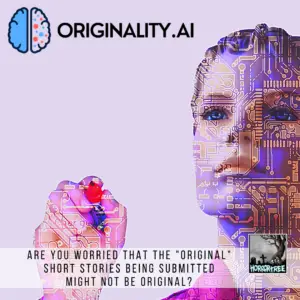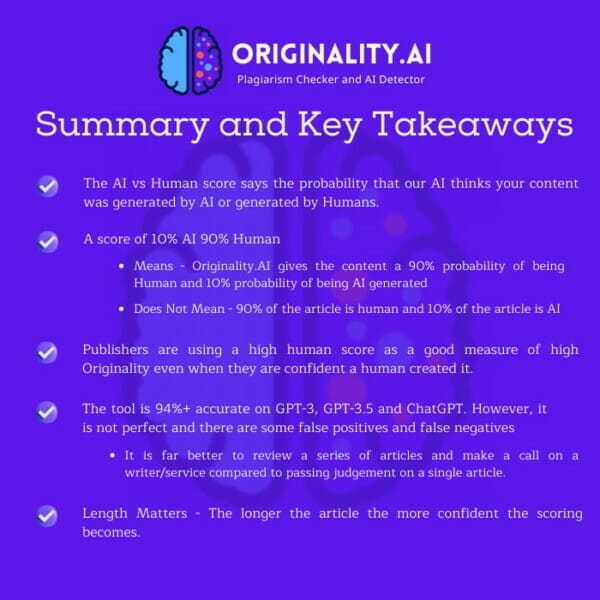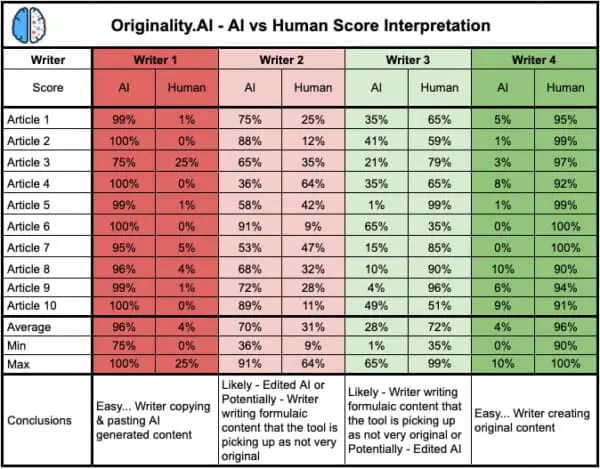AI: Are You Worried That The “Original” Short Stories Being Submitted Might Not Be Original?
 With the rise of artificial intelligence, it is only a matter of time before publishers start seeing an increase in short stories generated by AI flood their inboxes. While I think we can all agree that the technology isn’t there quite yet, it is getting closer by the day, and we can already see ways writers can use the content being generated to have their stories put together a bit quicker than what you’d traditionally see. It is even worse when it comes to non-fiction articles for your websites.
With the rise of artificial intelligence, it is only a matter of time before publishers start seeing an increase in short stories generated by AI flood their inboxes. While I think we can all agree that the technology isn’t there quite yet, it is getting closer by the day, and we can already see ways writers can use the content being generated to have their stories put together a bit quicker than what you’d traditionally see. It is even worse when it comes to non-fiction articles for your websites.
Any publisher who runs guest posts has to be concerned already about plagiarism, and now robot-generated content is another concern.
With the rise of AI writing, we’re also now seeing the rise of AI detectors, and today we’re going to be taking a look at one called Originality.AI. I should take this time to note that this article does contain affiliate links for the product, as I’m a huge supporter of it after I’ve tested it out. This means that a portion of any sale of a subscription to the service will go to Horror Tree and will NOT cause any increase to your purchase price.
I will note that two sections of this article were generated by AI, and they will be clearly labeled as we’re using them as a demonstration for how far AI has come AND to show that they were detected by the product.
What is AI-generated content?
AI-generated content refers to any kind of content such as text, images, or audio that is created using artificial intelligence algorithms. These algorithms can be trained on various types of data and can be used to generate new content that is similar in style or content to the original data. Examples of AI-generated content include text generated by language models like GPT-3, images generated by Generative Adversarial Networks (GANs), and audio generated by AI-powered music composition software.
Why is AI-generated content a concern?
AI-generated content is a concern because it has the potential to be easily mistaken as human-generated content. It can be used to generate fake news, impersonate individuals online, and create deepfake videos. Additionally, AI-generated content can be used to automate the creation of spam, phishing scams and other malicious content. It also poses a risk of spreading misinformation and potentially harming individuals or groups. Furthermore, there is also a concern about the potential for AI-generated content to displace jobs traditionally done by humans.
How can Originality.AI help?
There is an old saying that you sometimes have to “fight fire with fire.” The meaning behind this is that you need to use your enemy’s weapons against them. If you consider Artificially Generated Content an enemy, you may want to consider using AI to find it and stop it. Originality.AI was created for just that purpose. They call themselves “A Plagiarism Checker and AI Detector Built for Serious Content Publishers.” From my testing of the product, I have to say that they are very much on point.
I’ve fed over 50 articles and short stories through the software at this point. Of the ten pieces that it detected were 100% AI-generated, 9 of them were! (The 10th, has me really worrying about my humanity.) I also generated about ten articles and five short stories with a base in AI and edited them after the fact to make them flow better. Honestly, the AI-generated non-fiction was almost hard to add a personal flair to with how human sounding much of it was. It was able to detect a high amount of AI-generated content in each piece. Finally, the remaining twenty-five articles were all posts from Horror Tree that the staff has written before. I did see a few false positives between 1-20% on eight of the articles. However, it was quite obvious that anything over 60% seemed to be where the worrisome content was on what was automatically generated.
There is also a plagiarism tool included in the product, and it was spot on. In fact, it was able to detect that text in an article from the day I was testing the software from that specific blog post. I was quite impressed with how quickly and easily it was able to find something that existed online. I’ll be honest, this wasn’t the main point I had wanted to test for, but it worked great once I had started to use it!
Can you quit talking and show us some examples of Originality.AI already?
Absolutely! I generated the section for “What is AI-generated content?” above and re-wrote it in my own voice:

After that, I completely generated the “Why is AI-generated content a concern?” section. The only changes I made were two grammar issues that I just couldn’t ignore.

Finally, I write the entire section after that on my own:

As you can see, the results were impressively accurate from three different examples that live in this article alone. So, I can’t stress enough that if you are worried about AI-Generated content hitting your website from guest posts, your submissions from authors for an anthology, or in any other area – you need to do yourself a favor and give Originality.AI a try.
Addendum:
After we had written up the above information. Originality.AI released a condensed version of their information that makes understanding their scores a bit easier to follow.
The first image shares how to determine on a single article what the numbers mean:

The second image goes through and compares quite a few articles to get a better idea of the overall results:

These numbers appear to back up the results that I demonstrated above and really gives you a feel for the flavor of articles and if they were generated by AI or not.
- About the Author
- Latest Posts
Stuart Conover is a father, husband, published author, blogger, geek, entrepreneur, horror fanatic, and runs a few websites including Horror Tree!












